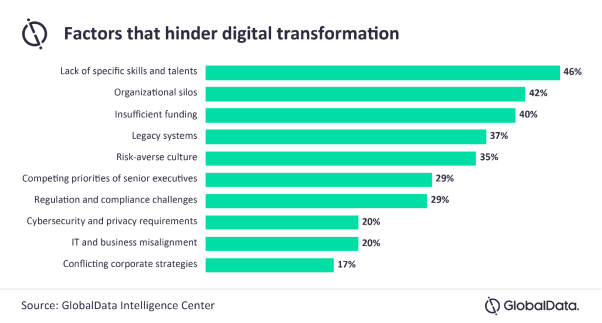Lack of skill and talent biggest challenge to digital transformation in pharma
Posted: 10 November 2020 | Victoria Rees (European Pharmaceutical Review) | No comments yet
A report has found that the biggest hurdle for digital transformation in pharma is a lack of specific skills and talents, followed by organisational silos.


A new report has highlighted the main challenges to digital transformation in pharma, a field which has garnered interest over the last year due to the the current COVID-19 pandemic and local and nation lockdowns. The report, from GlobalData, says that a lack of specific skills and talents (46 percent), organisational silos (42 percent) and insufficient funding (40 percent) are the main hindrances in pharma’s digital transformation efforts.
Globaldata Pharma conducted a 10-minute survey with 194 clients and prospects which was fielded from 17 September to 6 October 2020 to reveal their findings.
Urte Jakimaviciute, Senior Director of Market Research at GlobalData, commented: “As more companies turn to digital, a number of innovations covering every possible process in the pharmaceutical value chain is only going to increase. The success of digital transformation will heavily depend on employees being on board and adapting as digital transformation process is a never-ending change. While COVID-19 response scaled up digital transformation, it left many companies unprepared. Digital transformation is not the same as adding new applications and updating the company’s infrastructure. Understanding and applying new technologies requires specific skillsets, as technologies will fail to add value if people do not know how to work with them.”


“No industry was untouched by COVID-19 and the pandemic has turned digital skills into a ‘must have’ attribute, creating a huge demand for these skills. The gap between the demand and the supply of tech-savvy employees will widen, as companies compete for the same talent pool. Interestingly, the risk-averse culture which was scored as a number one hindrance in 2019, moved further down the list 35 percent in 2020, suggesting that a larger number of organisations see a digital transformation as a necessity rather than a choice,” said Jakimaviciute.
Related topics
Data integrity, Digital, Industry Insight, QA/QC, Technology









